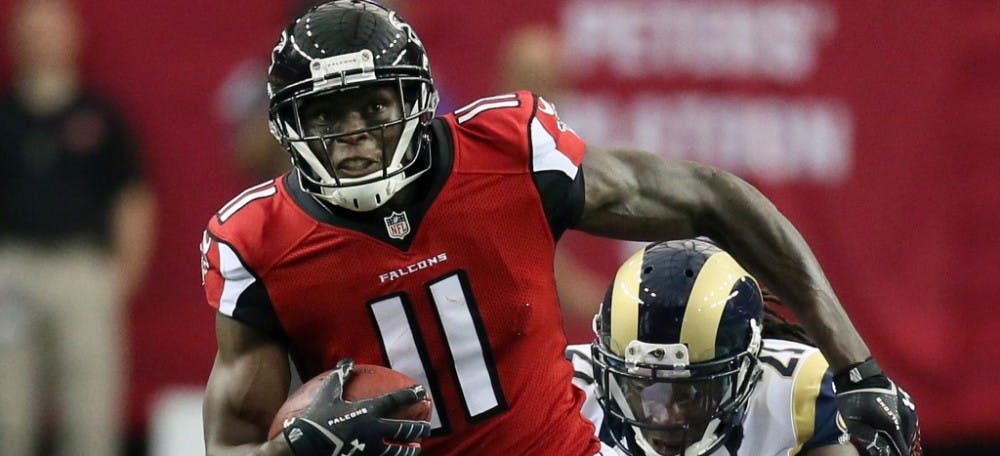“With the 6th pick in the 2011 NFL Draft, the Atlanta Falcons select Julio Jones, wide receiver, Alabama.”
This announcement by Roger Goddell way back when confirmed exactly what the Falcons were thinking leading up to the 2011 season when they sacrificed two first round picks, a second round pick and two fourth round picks to swap spots with the Cleveland Browns to get Jones. General manager Thomas Dimitroff said later that the move might not be right for the team two or three years from now, but the timing was perfect for the Falcons to make a bold move.
Just one more player was needed, one more dynamic piece to put alongside their balanced, methodical offense to push them over the top into true Super Bowl contention. Jones has certainly become the explosive pass-catcher the Falcons have envisioned him to be, despite nagging injuries, but at what cost?
Well, the Falcons are currently 2-7, just two years after a supposed franchise-altering trade with Cleveland, which isn’t faring much better at 4-5. A large part of Atlanta’s sudden decline after a NFC championship game appearance last season is the decimation of their roster due to injury. Key starters such as Jones, Roddy White, Sean Weatherspoon, Sam Baker and Steven Jackson have all dealt with injuries this season, and Jones’ cost him the entire season.
Atlanta has ushered in Drew Davis, Darius Johnson, Lamar Holmes, Joplo Bartu, Malliciah Goodman and others to fill the voids with lackluster results. For these young players, playing time will lead to dramatic improvement and adjustment to the NFL speed, helping them step in for the starters down the road. But did the Falcons front office in 2011 expect to be looking at a 2-6 team with Drew Davis and Joplo Bartu starting instead of a 6-2 team with Julio Jones and Sean Weatherspoon starting? I doubt it, and that’s why Dimitroff and the Falcons “all-or-nothing” strategy, giving up major assets for one elite player instead of quality roster depth, might keep them short of their Super Bowl aspirations.
A common misconception I have heard in regards to championship runs is that the best teams don’t win; the healthiest do. Injuries happen in the NFL. That’s just the way it is. If you assembled a roster of the currently injured players, that team would look terrifying on paper.
Offense
QB: Aaron Rodgers
RB: Vick Ballard, Ahmad Bradshaw
WR: Julio Jones, Michael Crabtree, Reggie Wayne, Percy Harvin
TE: Dwayne Allen, Dennis Pitta
OT: Ryan Clady, Russell Okung
OG: Jonathan Cooper, Carl Nicks
C: Maurkice Pouncey
Defense:
DE: Anthony Spencer, Jason Jones
DT: Geno Atkins, Vince Wilfork
OLB: Lance Briggs, Clay Matthews
ILB: Brian Cushing
CB: Leon Hall, Aqib Talib
S: Harrison Smith, Stevie Brown
Yes, it’s a 4-3 defense and Clay Matthews is probably used to being a 3-4 OLB. I feel like he could adjust. If not, replace him with Jerod Mayo. This team would very easily contend with any other roster you put up against them, despite a suspect running game. And an all-injured team could be made for any season and it would look menacing. My point is that talented players get injured for an extended period of time every year. Relying on the health of a few game-changers like the Falcons did these past couple of seasons is not the formula for success.
What works in the NFL is depth, and lots of it. The past three Super Bowl winners — the Green Bay Packers, New York Giants and Baltimore Ravens — all had difficult injuries to deal with throughout their respective seasons. James Starks had to bolster the stagnant Green Bay rushing attack, and undrafted rookie Sam Shields had to hold his own in pass coverage. For New York, a way-past-his-prime Brandon Jacobs and career backup Chase Blackburn played in crucial moments during the playoffs. In Baltimore, Ray Lewis, Terrell Suggs and Lardarius Webb all dealt with injuries, leaving guys like Dannell Ellerbe, Paul Kruger and Cary Williams to do the heavy lifting. The emergence of backups gave all of these teams a lift when they needed it most; injuries occurred to every other team, but only the championship winners had the depth capable of surviving the blows and playing quality snaps when necessary.
The Falcons move to get Jones in the draft was flashy, as well as a nudge to the other teams to let them know they’re all in, and damn confident about it. Once the injury bug struck Atlanta this season, the aftereffects of the trade could be seen in plain sight. Draft picks are highly valued commodities and free passes to add young, cheap depth. That’s why the Packers, Giants and Ravens rarely trade up to get a game-changing star. They trust their scouts to give them good information on sleepers they could pick up late, and they trust their coaching staff to develop the players that they picked up late into guys who can start in Super Bowls.
Winning in the NFL doesn’t equate to having the most impressive fantasy roster. It’s about surviving and advancing, even without guys who were lynchpins of the offense or defense. If one player goes down, the backup is always prepared to move on up. The Falcons have taken some tough blows this season, but who hasn’t? Unlike championship winners of years past, the Falcons thought they were one player away in the fateful 2011 draft. That one player is now out for the year, and Atlanta has questions to answer about what else they need to climb back into the title hunt.


